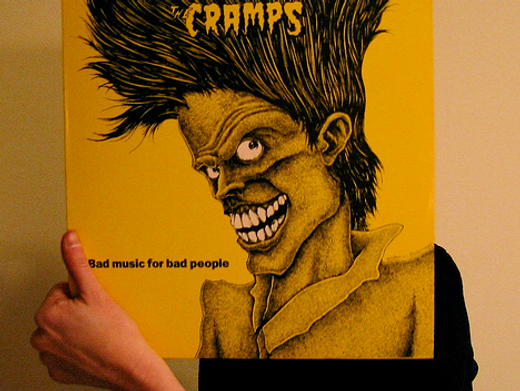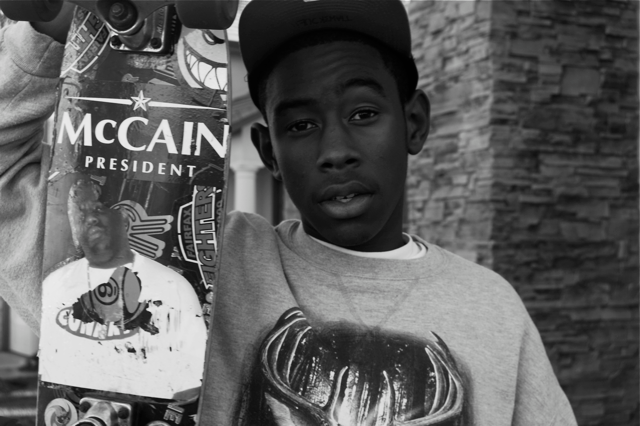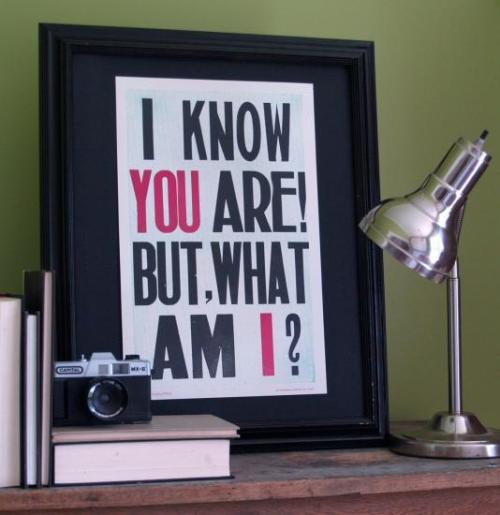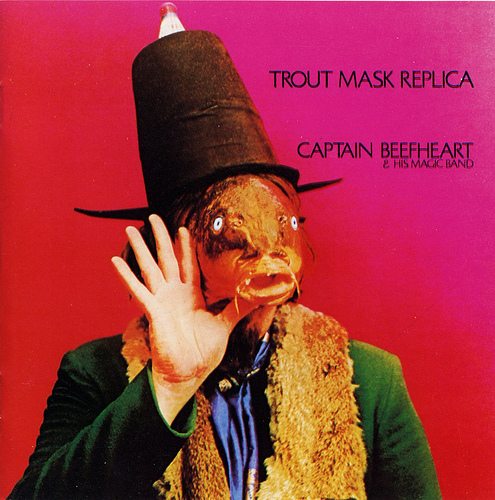 As irresistible as list-making may be, it presents a problem that I've purchased precisely zero albums released within the last calendar year. I've been given quite a few records by friends, but I can't convince myself (let alone anyone else) that the best albums of 2010 happen to be by all my buddies' bands, whom you've never heard.
As irresistible as list-making may be, it presents a problem that I've purchased precisely zero albums released within the last calendar year. I've been given quite a few records by friends, but I can't convince myself (let alone anyone else) that the best albums of 2010 happen to be by all my buddies' bands, whom you've never heard.But I've not been incurious as a listener; I think I've explored a wider array of new sounds than I have in at least several years. It just so happens that almost none of this exploration has been contemporary - not that contemporary music has encouraged me to explore it much. (Seriously, with Best-Of lists like these, who needs Worst-Of lists?) Thanks to the Internet's obliteration of the over-/underground divide, even the most subterranean acts are tempted by the possibility of a pop crossover, implicitly depressing experimental daring.
The other problem posed by the Internet is what Patton Oswalt dubs "etewaf": Everything That Ever Was - Available Forever. New musicians must compete not only with each other, but with the sum-total of musical history which is now but a right-click away. Rather than liberating listeners from the dull hegemony of current trends, this suffocates them with option paralysis. From this, the modern audience appears to bifurcate into obedient contemporaneity on one hand, conservative retrovision on the other.
This presents career-minded musicians with three wholly unpleasant options:
- Craft face-punchingly moronic Aspartame pop that seizes listeners within the first 30 seconds and fails to disappoint by going precisely nowhere.
- Pattern your tunes after a tried-and-true template (be it Springsteen, Toni Basil, or Klaus Schulze) with plagiaristic fidelity.
- Give up and enjoy your obscurity.
 Many would argue that the very curse of the internet is its blessing: everything that ever was - available forever! But, as Oswalt explains, "that creates weak otakus. Etewaf doesn’t produce a new generation of artists — just an army of sated consumers. Why create anything new when there’s a mountain of freshly excavated pop culture to recut, repurpose, and manipulate on your iMovie?" Indeed, this is the fundamental problem of the digital environment in general, as Jodi Dean elaborates in her brilliant book, Blog Theory:
Many would argue that the very curse of the internet is its blessing: everything that ever was - available forever! But, as Oswalt explains, "that creates weak otakus. Etewaf doesn’t produce a new generation of artists — just an army of sated consumers. Why create anything new when there’s a mountain of freshly excavated pop culture to recut, repurpose, and manipulate on your iMovie?" Indeed, this is the fundamental problem of the digital environment in general, as Jodi Dean elaborates in her brilliant book, Blog Theory:...no authority tells the subject what to do, what to desire, how to structure its choices. Žižek argues, however, that in fact the result of the Master's decline is unbearable, suffocating closure. The online environment Second Life clearly demonstrates this closure: able to do or create anything (there aren't even laws of gravity), the majority of users end up with avatars that are sexier versions of themselves walking around shopping, gambling, fixing up their houses, and trying to meet people ("meet" can be read euphemistically here). It's not only boring - it's stifling as it confronts users with their lack of skills and imagination.To be sure, there are those (myself included) to whom "etewaf" has been a boon. Anyone with a dram more discipline than the average subcultural tourist has access to whole goldmines that before were largely inaccessible by time, distance, and/or cost. Then again, we're the very people who, in Ye Olde Offline Times, had the curiosity & dedication to pursue our niche manias despite the prohibitions of time, distance, and/or cost.
As such, my chief means of musical exploration is the same now as fifteen years ago: talking with friends nerdier than myself. Ergo, to give credit where it's truly due, here are the top 5 influences upon my listening habits across 2010.
1. Watching Too Many Old Movies
As I mentioned a month ago, I was recently inducted into the gruesome world of giallo cinema. What's odd is the genre's initial appeal lies not in its cinematic strengths (which, depending on the film, are frequently few) but in its soundtracks. The friend who introduced me to gialli made no attempt to sell the genre on its Swiss-cheese screenwriting or Mexican soap-opera acting; instead, he pointed me towards the tonal warp of Bruno Nicolai's strings and the violent arrhythmia of Ennio Morricone's scores for Dario Argento.
If a score was particularly striking, I'd actually get around to watching the movie. Occasionally, the movie would exceed my (admittedly minimal) capacity for guts 'n' gore, which sent me in search of less graphic films of the same vintage. Spy thrillers fit this bill perfectly, from the cartoonish Danger: Diabolik to the more cultivated Harry Palmer trilogy. What these films held in common with the gialli is that the soundtracks often outstripped the films themselves in quality - especially John Barry's ominously exotic score for The IPCRESS File.
2. Co-Producing a Hip-Hop Album
The friend who introduced me to the giallo films had an ulterior interest in their obscure & outlandish scores: as a largely-untapped source of samples. For a couple of years, he's been quietly piecing together a hip-hop album that, even in its unfinished state, is more musically compelling than damn near any album since Fantastic Damage. I was flattered & a little intimidated when he asked me to help sculpt the record's sound, given that I'd yet to produce any hip-hop. This prompted me to research as much left-of-center hip-hop as I could handle, starting with prolific oddballs Madlib and his brother Michael "Oh No" Jackson. Though their total lack of self-editing makes for an uneven discography, I far prefer their analog grime to the slick digital minimalism that currently dominates mainstream hip-hop.
3. Talking To Other Bands On Tour
Obviously, what I've enjoyed the most about being back on the road is playing gigs. But it's also the perfect idiom to geek out as a listener - after all, what greater music nerds than musicians themselves? Our March tour with Lostage was especially enjoyable, whether it was comparing the spoils of some dedicated crate-digging (Karp for ¥300!) or turning each other on to unfamiliar acts. I'm especially grateful for the introduction to Z, whom I became immediately convinced are the best band in Japan.
4. Attending Salford University's Noise Conference
When in spring I blagged my way into an academic conference on "noise," it became suddenly incumbent that I know what I was talking about. I've never actually been a great fan of noise music: I usually find it either a pompous incursion into the "unintentional" soundworld, or just plain boring. But if I was going to participate in a 3-day conference on the subject, I'd better be on more intimate terms with it than merely having attended a My Bloody Valentine concert. Mercifully, I'd chose to focus primarily on the No Wave scene, whose "noise" was less noise outright and more about the expansive blurring of rock's outermost boundaries. This way, I got to listen to my Swans & Sonic Youth records on loop and legitimately call it "research."
The conference itself was every bit the brain-massage I'd hoped. Not only did everyone have something interesting to say, they were quite affable & easy-going. I was thrilled to have found a social milieu where the slurry pub talk would be about, say, the apparent dearth of right-wing prog rock. This niche of ne plus ultra nerdom also exposed me to musical cul-de-sacs of which I had no previous knowledge. Who knew that the Madchester sound owed its very existence to the early-'80s Sheffield scene, and why hadn't they told me before about long-forgotten visionary acts like Hula?
5. Not Being Sated By All the Above
Finally, the maniac's calling card is that there is never enough. Despite musical riches heaped upon my ears by the above experiences, I still craved more strange sounds, more uncharted territory, more unfamiliar artists - which is why I have to acknowledge a certain debt to the "etewaf" phenomenon. Between online retailers like the unequaled Aquarius Records and such appetent blogs as Son of Zamboni, Dayvan Zombear, and OngakuBaka, I became acquainted with countless enthralling artists I'd not yet had the pleasure of hearing: library funkmeister Janko Nilovic, space-rock svengali Walter Wegmüller, Ulaan Khol's rustic soundscapes, and (possibly my most oft-spun album of 2010) Getatchew Mekurya's barnburning collaboration with Dutch post-punks The Ex. I eagerly anticipate what exotic & intriguing sounds I'll be exposed to in the coming year.
And to you, I give a small cross-section of the fruits of the explorations detailed above. Click on the mix title to download, and all the best for 2011.
The War of Attrition On the Listener's Attention
1. John Barry - "Main Title" from The IPCRESS File OST
2. Tyler, the Creator - "French!"
3. Karp - "Forget the Minions"
4. Sonic Youth - "Major Label Chicken Feed"
5. Hula - "Red Mirror"
6. Ennio Morricone - "Trafelato" from Giornata Nera Per l'Ariete OST
7. Walter Wegmüller - "Der Wagen"
8. Getatchew Mekurya & the Ex - "Ethiopia Hagere"
9. Oh No - "Smoky Winds"
10. Z - "新今日"




































